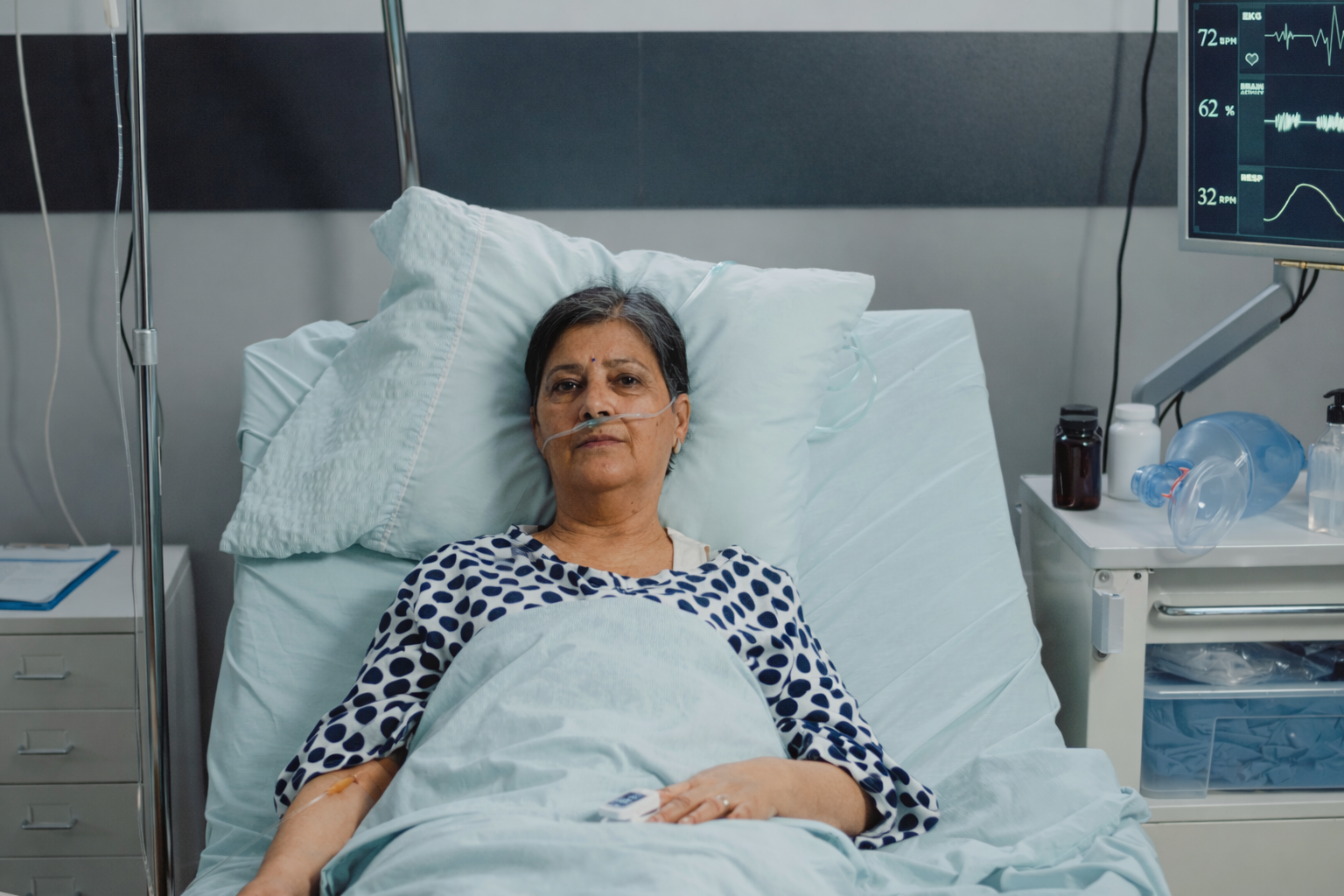At Tulip Multispeciality Hospital, we recently managed a challenging case of a 53-year-old woman, Mrs. Manthiram M, who presented with symptoms of possible urosepsis with acute delirium, vomiting, and hyponatremia. Under the exceptional care of Dr. Prabhu E, a physician with over 30 years of experience in Internal Medicine and Endocrinology, the patient made a complete recovery through accurate diagnosis, timely treatment, and close follow-up care.
This case demonstrates that when treated in a structured hospital environment by an experienced doctor, complex internal medical conditions, even if initially serious or life-threatening, can have excellent outcomes.
Understanding the Medical Conditions
What Is Acute Delirium?
Acute delirium is a sudden disturbance in mental function characterized by confusion, disorientation, restlessness, drowsiness, or altered behavior. It develops rapidly – often within hours or days – and is usually triggered by an underlying medical condition such as infection, dehydration, metabolic imbalance (such as low sodium), or certain medications.
This is not a disease in itself, but a serious warning sign that something is wrong within the body. In many middle-aged and elderly patients, acute delirium may be the first visible symptom of conditions such as sepsis (spread of infection in the body), hyponatremia (low sodium levels), or decreased oxygen supply to the brain. Prompt identification and treatment of the underlying cause is important for recovery and preventing further complications.
Common causes include:
- Severe infections (sepsis or urinary tract infection)
- Electrolyte imbalance – especially low sodium (hyponatremia)
- Dehydration or malnutrition
- Liver, heart, or kidney failure
- Hypoxia (low oxygen supply to the brain)
- Medication side effects or drug withdrawal
- Metabolic disorders (thyroid, diabetes, or adrenal issues)
- Neurological problems such as stroke or head injury
- Poor nutrition or dehydration
Typical symptoms:
- Sudden confusion or drowsiness
- Difficulty recognizing familiar people or surroundings
- Agitation or restlessness
- Incoherent speech
- Sleep–wake disturbances
- Mood swings or hallucinations
If left untreated, delirium can progress to coma or permanent brain dysfunction, especially in elderly or chronically ill patients.
Why it matters:
Delirium can often be reversed if the underlying cause is found and treated promptly. However, if ignored, it can lead to irreversible brain injury or multi-organ dysfunction.
What Is Sepsis?
Sepsis is the body’s extreme and life-threatening response to infection. When bacteria or their toxins enter the bloodstream, the immune system releases chemicals to fight them, but this can trigger a massive inflammatory response that damages tissues and vital organs such as the brain, kidneys, liver and heart.
In Mrs Manthiram’s case, the infection probably started in the urinary tract, a condition called urosepsis. This occurs when a urinary tract infection spreads into the bloodstream, causing widespread inflammation. Without prompt and appropriate treatment, urosepsis can progress rapidly and result in septic shock, a serious condition that can lead to multi-organ failure and be life-threatening.
Causes of sepsis:
- Urinary tract infections (urosepsis)
- Pneumonia or lung infection
- Abdominal infections (appendicitis, gallbladder infection, diverticulitis)
- Skin or wound infections
- Post-surgical or catheter-related infections
Common warning signs of sepsis:
- High heart rate (tachycardia) (above 100 bpm)
- Fever or low body temperature
- Rapid breathing or shortness of breath
- Low blood pressure
- Confusion, drowsiness, or fainting
- Decreased urine output
- Cold, Pale, or clammy skin

Sepsis is a medical emergency. Without prompt treatment, it can lead to septic shock, organ failure, and death.
At Tulip Multispeciality Hospital, sepsis cases are treated with immediate IV antibiotics, fluids, oxygen therapy, and continuous monitoring in the Intensive Care Unit (ICU) — ensuring quick stabilization and prevention of organ failure.
What Is Urosepsis?
Urosepsis is a severe form of sepsis that results from a urinary tract infection (UTI). This occurs when bacteria from the bladder or kidneys enter the bloodstream, causing infection to spread throughout the body.
This condition is especially common in elderly patients, menopausal women, and individuals with chronic diseases such as diabetes, as their immune systems may be weakened or less able to effectively fight infection. If a urinary infection is not treated, it can rapidly turn into urosepsis, causing widespread inflammation, organ dysfunction, and potentially life-threatening complications.
Risk factors for urosepsis:
- Untreated urinary tract infections
- Kidney stones or obstruction
- Diabetes or a weakened immune system
- Use of urinary catheters
- Chronic kidney disease
- Prolonged catheter use
- Low immunity or diabetes
- Dehydration and poor fluid intake
Symptoms:
- Burning sensation while urinating
- Lower abdominal or back pain
- Fever and chills, and body aches
- Nausea, vomiting, or confusion
- Decreased urine output
- Fatigue or drowsiness

Prompt antibiotic therapy and fluid resuscitation are necessary to prevent kidney damage and septic shock. Early detection through urine culture, blood tests, and imaging helps in timely treatment and a complete cure.
What Is Hyponatremia?
Hyponatremia refers to low levels of sodium in the blood (below 135 mmol/L). Sodium plays an important role in maintaining fluid balance, nerve function, and muscle contraction. When sodium levels get too low, excess water moves into the body’s cells, causing them to swell, including brain cells.
This inflammation can cause symptoms such as headache, confusion, drowsiness, vomiting, and even seizures. Hyponatremia often occurs with infection, dehydration, or other fluid imbalance, and if not treated, it can become a serious and potentially life-threatening condition that requires immediate medical attention.
In this case, dehydration and infection-related hormonal changes are likely to cause hyponatremia, which contributes to the patient’s delirium.
Causes of hyponatremia:
- Excessive vomiting or diarrhea
- Excess water retention, Overhydration, or inappropriate IV fluid use
- Kidney disease or adrenal insufficiency
- Certain medications (diuretics, antidepressants)
- Hormonal imbalances (SIADH – Syndrome of Inappropriate Antidiuretic Hormone Secretion)
- Severe infections or sepsis
- Sepsis and systemic infections
Symptoms:
- Fatigue and headache
- Nausea and vomiting
- Confusion or loss of consciousness
- Muscle weakness or cramps
- Seizures in severe cases

Treatment includes careful sodium correction, fluid management, and resolution of the infection responsible for the imbalance. Quick recovery is best avoided to prevent neurological complications, making specialist supervision important.
Case Summary: Mrs. Manthiram M’s Recovery Journey
Initial Symptoms:
- Drowsiness and vomiting (five times)
- No fever, no diarrhea
- History of poliomyelitis
- Mild low blood pressure and high pulse rate
After thorough evaluation, she was diagnosed with Acute Delirium secondary to Sepsis (?Urosepsis) with Hyponatremia.
Treatment given:
- IV fluids to correct dehydration and restore electrolyte balance
- Broad-spectrum IV antibiotics to control infection
- Electrolyte monitoring with sodium correction
- Continuous vital monitoring for blood pressure, oxygen saturation
- Neurological assessment for improvement in mental status
On 29/09/2025, she developed breathing difficulty and was shifted to the ICU for close observation and advanced care.
Under Dr Prabhu E’s expert supervision, her condition improved steadily. Oxygen therapy, antibiotics, and supportive medications helped stabilize her vital signs.
- By 02/10/2025, she was fully alert, breathing comfortably, and discharged in stable condition with advice for follow-up and preventive care.
- Her case underscores how prompt internal medicine management and ICU support can turn a critical case into a complete recovery.
Why Early Diagnosis Matters
Early recognition and treatment of delirium, sepsis, and electrolyte imbalance can prevent life-threatening complications such as brain injury, kidney failure, or septic shock. At Tulip Multispeciality Hospital, each patient undergoes intensive multidisciplinary evaluation – combining internal medicine, critical care, and laboratory support to ensure rapid stabilization and recovery.
About Dr. Prabhu E – Senior Consultant, General Medicine

Qualification: MD (General Medicine)
Experience: Over 30 Years
Specialties: Internal Medicine, Endocrinology, Non-Communicable Diseases (NCD), Preventive Health
Dr. Prabhu E is a highly respected physician at Tulip Multispeciality Hospital, known for his deep expertise in diagnosing and managing complex medical disorders. His career spans more than three decades, during which he has successfully treated thousands of patients with chronic and acute illnesses.
Areas of Expertise:
- Diabetes, Hypertension, and Cardiac Disorders
- Thyroid, Adrenal, and Hormonal Disorders
- Sepsis, Infections, and Metabolic Diseases
- Kidney and Liver Function Disorders
- Fertility Issues Related to Hormonal Imbalance
- Geriatric Medicine and Lifestyle Disease Management
Approach to Patient Care:
Dr. Prabhu believes that effective medicine goes beyond prescriptions — it’s about patient education, empathy, and building trust. He spends time understanding each patient’s lifestyle, medical history, and family background to create individualized treatment plans.
His approach emphasizes:
- Preventive health and early screening
- Lifestyle modification counseling
- Long-term management of chronic illnesses
- Human-centered care and patient comfort
Under his leadership, the General Medicine Department at Tulip Multispeciality Hospital has become a model of holistic care, combining advanced diagnostics with compassionate clinical practice.
Prevention and Lifestyle Tips
To reduce the risk of infections and electrolyte imbalances:
- Stay hydrated, especially during illness or heat exposure.
- Treat urinary symptoms early — burning or frequent urination should never be ignored.
- Maintain proper hygiene to prevent urinary infections.
- Manage chronic illnesses such as diabetes and hypertension regularly.
- Avoid overuse of diuretics or self-medication.
- Eat a balanced diet rich in fruits, vegetables, and adequate salt intake.
- Regular medical check-ups help detect issues before they become serious.
Diagnostic Excellence at Tulip Multispeciality Hospital
To manage complex internal medicine cases effectively, Tulip Multispeciality Hospital employs advanced diagnostic tools, including:
- Blood tests: Complete blood count, infection markers, and electrolytes
- Urine culture and sensitivity for identifying bacterial causes
- Ultrasound abdomen for kidney and bladder evaluation
- CT scans are used when an infection spreads or an abscess is suspected
- Electrolyte and renal function panels for monitoring hyponatremia and sepsis impact
The hospital’s round-the-clock laboratory and ICU services ensure that critical conditions are detected and managed without delay.
Patient Education: How to Prevent Sepsis and Delirium
To stay healthy and prevent such life-threatening conditions, Dr. Prabhu recommends these essential steps:
- Stay Hydrated: Drink 2–3 liters of water daily unless restricted for medical reasons.
- Manage Chronic Conditions: Keep diabetes, hypertension, and thyroid under regular control.
- Treat Infections Early: Do not ignore burning urination, fever, or weakness.
- Avoid Self-Medication: Unsupervised antibiotic or diuretic use can worsen infection or hyponatremia.
- Get Regular Checkups: Annual health screenings can detect early imbalances or organ dysfunction.
- Maintain Nutrition: Eat fiber-rich, balanced meals to support immunity and hydration.
- Recognize Warning Signs: Confusion, rapid heart rate, and fatigue should prompt an immediate hospital visit.
Tulip Multispeciality Hospital: A Center of Trust and Healing
At Tulip Multispeciality Hospital, our mission is to provide comprehensive, technology-enabled, and compassionate care. We combine expert physicians like Dr. Prabhu E with modern infrastructure, 24×7 ICU facilities, and personalized nursing care.
Every patient’s journey – from diagnosis to discharge – is managed with precision, compassion, and safety. The philosophy of the hospital is simple: treatment is not just about medicine – it is about humanity, hope, and overall recovery.
Conclusion
The case of Mrs Manthiram M illustrates the importance of rapid intervention and specialist medical care in the management of acute delirium, sepsis, and hyponatremia. Under the professional supervision of Dr. Prabhu E, she made a full recovery through careful clinical management and personal care.
His story is a reminder that timely diagnosis, skilled doctors, and patient-centered treatment can save lives – even in serious conditions.
Frequently Asked Questions (FAQ)
- What causes acute delirium in adults?
Delirium is most often triggered by infections, dehydration, medication reactions, or metabolic imbalances such as low sodium. It can develop suddenly and needs urgent medical attention. - Is urosepsis dangerous?
Yes. Urosepsis occurs when a urinary infection spreads to the bloodstream, leading to sepsis. It can be fatal if untreated, but it is highly curable with early antibiotics and fluids. - How is hyponatremia treated?
Treatment depends on the cause and severity. It may include IV saline, medication adjustment, and fluid restriction. Sodium levels must be corrected gradually under medical supervision. - How can sepsis be prevented?
By promptly treating infections, maintaining hygiene, managing chronic illnesses, and seeking early medical help for fever or confusion. - When should I go to the hospital?
If you or a loved one experiences sudden confusion, high heart rate, low blood pressure, persistent vomiting, or breathing difficulty, seek immediate emergency care — these may signal sepsis or electrolyte imbalance.












